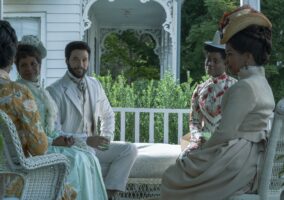NOTE: This post will be so gushing that we feel we should skip right to the end and thank Netflix for buying us that car.
Kidding!
But really, that’s how much we’re going to gush. Bear in mind the last time we pretty much ordered y’all to watch a TV show was when we wrote a little post entitled “If you’re not watching Mad Men, you’re crazy.” And we all know how that one turned out, don’t we? Trust us: you need to watch this show. We would like to think that our personalities are so forceful and our reputation for being tastemakers and pop culture influencers so impeccable that we don’t have to write another word and you’re all making firm commitments to watch the show immediately, but you’re going to make us keep typing to convince you, aren’t you? Fine.
Based on Piper Kerman’s best-selling memoir of the same name, the Netflix original series tells the more fictionalized story of Piper Chapman, a privileged, engaged WASP who finds herself doing time in a federal prison because she had a same-sex fling in college ten years before with a glamorous drug runner who got her involved in the business. Her youthful fuckup catches up with her just as she’s about to launch her line of artisanal soaps and settle into newly engaged bliss with her perfect fiance, Larry. We don’t blame yo u if this doesn’t sound appealing; like some sort of borderline-offensive cross between Private Benjamin and Oz, glossing over the realities of the U.S. prison system by looking at it through the eyes of a white woman. You’ll be happy to know that not only is the show way more than that, but it’s so self-aware that it makes both Private Benjamin and Oz jokes during the season. Hell, it’s so self-aware that it has an African-American character saying to a white character, “This isn’t The fucking Help, bitch, but you will eat my shit.”
u if this doesn’t sound appealing; like some sort of borderline-offensive cross between Private Benjamin and Oz, glossing over the realities of the U.S. prison system by looking at it through the eyes of a white woman. You’ll be happy to know that not only is the show way more than that, but it’s so self-aware that it makes both Private Benjamin and Oz jokes during the season. Hell, it’s so self-aware that it has an African-American character saying to a white character, “This isn’t The fucking Help, bitch, but you will eat my shit.”
What we want to get across to you more than anything else is just how much this show sticks with you for days after you watch it. Since the entire season dropped on Netflix last week we wound up binge-watching the whole thing. Maybe you could be a little more judicious in your viewing and spread it out more, but honestly, we don’t see how. Practically every episode ends with the viewer wanting more, urging them to immediately click on the next one.
Actually, that’s not quite true. That’s not what we want to get across to you the most. What we really want you to understand is that this show isn’t what you probably think it is.
Yes, it starts from the point of view of a white woman in the prison system; and yes, you are going to see the story play out some “caged women” tropes that could rightly be called cliche, like the shower sex and the prison yard death threats and the “scary” bull dykes and violently crazy women of color. But almost immediately, the show makes the choice to move past Piper and her wide-eyed introduction to this world in order to tell the stories of all the other women in there with her. By employing a series of Lost-style flashbacks in order to show everyone’s path to a life behind bars, the show can go pretty much anywhere in American life and shine a light on it. The result is a story about choices and about the losses that come with bad ones. This is why it’s such a good show and why it sticks with you for days; because there isn’t an adult alive who can’t understand how hard it is to make choices and how devastating it is when those choices backfire and the punishments come.
But, in some ways, more importantly, this show isn’t just about general, universal truths. These are clearly and specifically women’s stories; about the choices women have to make in this world and about the millions of different ways the world conspires to rob women of their agency or hold them back from their potential. This is not to say that every character is an innocent flower and merely a victim. No, these are difficult, hard women; and their choices are not always easy to watch, but they are almost always understandable and heartbreaking.
But digging down even further, it’s clear to us that the strength of the tale isn’t that it’s universal and isn’t even that it’s women-specific, but that it tells the stories of the types of women who don’t get their stories told in our culture: black women, Hispanic women, fat women, butch women, bi women, old women, immigrant women, uneducated women – and even a trans woman’s story. When the season is done, you will be astonished at the vast range of women you’ve been exposed to and if you reflect on it, will probably be a little depressed that such stories are so rare in our culture.
It’s a very rare, nearly impossible thing for a story to be so well-constructed that it works on a universal level, on a gender level, and further in, on a sexuality/race/ethnicity/education/income level. It manages to tell all these stories and pay the highest respect to them all, whether we’re looking at an African-American trans woman trying to stay connected to her son and wife or a privileged white girl finding out she’s constructed a lie about herself and built a life around it, or an older Russian immigrant (the amazing and unrecognizable Kate Mulgrew) so hardened by life that she scares everyone around her, or a highly talented athlete who threw it all away for the most foolish of reasons. It helps tremendously that the cast is so across-the-board talented. There are a lot of them and there isn’t one weak link in the bunch. All of the performances are engrossing. All the stories are fascinating. Don’t be fooled into thinking it’s a story about a white girl forced to live amongst the exotic coloreds. It’s not that AT ALL. In fact, it deliberately – a nd brilliantly – subverts that expectation. In addition, it’s so brilliantly constructed that certain story points will unfold and you’ll be surprised by them, but you’ll immediately see that the story worked hard to set them up well. There’s even an excellently deployed Chekhov’s Gun. When you get to the final moments of the season, you’ll marvel at how well the writing set everything up to get to this amazingly revelatory and cathartic moment – that will have you howling that you’re going to have to wait almost a year for season 2 to drop.
nd brilliantly – subverts that expectation. In addition, it’s so brilliantly constructed that certain story points will unfold and you’ll be surprised by them, but you’ll immediately see that the story worked hard to set them up well. There’s even an excellently deployed Chekhov’s Gun. When you get to the final moments of the season, you’ll marvel at how well the writing set everything up to get to this amazingly revelatory and cathartic moment – that will have you howling that you’re going to have to wait almost a year for season 2 to drop.
Oh, and if you’re concerned about this sort of thing, it’s not a particularly violent show (although there are brief moments), nor is it open-a-vein depressing. It’s too heartfelt and humanistic to be so. And funny? You will slide off the couch laughing when you’re not reaching for the Kleenex. Since the show’s creator is Jenji Kohan, late of Showtime’s Weeds, you should expect some biting-as-hell social commentary as well as some incredibly witty and on-point dialogue. And yes, lead character Piper Chapman is every bit as annoying and self-involved as Nancy Botwin. Fortunately, she’s surrounded by people who constantly call her on her considerable bullshit.
See it. See all of it. If for no other reason than to look at and listen to the kinds of women you don’t see on TV. Then come back here and talk about it. You’ll want to.
[Photo Credit: Barbara Nitke for Netflix]
Mad Style: In Care Of Next Post:
American Horror Story: Bitchcraft
Please review our Community Guidelines before posting a comment. Thank you!




